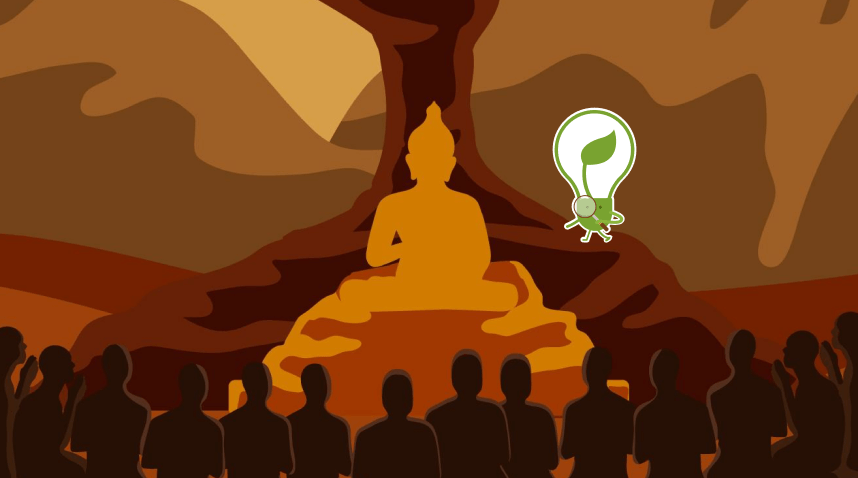TLDR: Don’t believe everything that someone claims to be Dhamma – before accepting or rejecting it, verify what was said with the Buddha’s discourses. Also, remember that we don’t have to feel any ill-will towards what we have decided to reject – simply put it aside and move on.
So I received a new update from the telegram channel managed by Handful of Leaves, a young Buddhist organisation in Singapore.
A new podcast episode featured a well-known Dhamma teacher, Mr. Vijaya Samarawickrama. The podcast Dhamma vs. Adhamma ft. Uncle Vijaya can be accessed on either Spotify or on YouTube. The following is what I’ve learnt from this podcast episode.
A Brief Aside
But before that, here are the causes and conditions that led to me writing this short article here.
The beginning of 2020 was pretty rough. I had just resigned from my first full-time job, and was unable to find another job. This period also was around the start of the pandemic, and Singapore had implemented the circuit breaker.
I felt lost and helpless as all sorts of negative self-talk (which I now know are simply proliferations, tricks and illusions made up by the mind) invaded my mind. That was the time I turned towards some form of spirituality.
I decided to spend time volunteering at a non-profit organisation near my residence that distributes food packs for the poor (a great reason to get out of the house). I also started researching the Buddhist scriptures. The first text I read was the Heart Sutra (Chinese version; new English version), which I felt (and still do feel) was beautifully written, followed by a few others in the Mahayana Canon.
Eventually, the circuit breaker was lifted, I received an offer from my next employer, and everything seemed to fall back into place again (I now know that this was simply the mark of impermanence of circumstances at work).
One thing led to another, and soon I was reading the Pāli Suttas on SuttaCentral. Having an inquisitive mind, I thought, “Why do some texts say this and others say that?” I thought there were some contradicting statements among the various texts, and I wondered why this was so.
After a brief period of mental gymnastics, I decided that I had to find a teacher if I wanted to make any progress in learning the Dhamma. So I did and headed straight to the Buddha Dhamma Mandala Society at Balestier Road, where Ven. K. Anoma now stays, and also where I still continue to learn the Dhamma.
Again, one thing led to another and I soon learnt that the Historical Buddha himself had advised against simply believing anything anyone says, but instead to test it out for oneself first before making any decision. I was then well on my way in search of the Truth.

Gold Standard
If there is any concise text that is the “gold standard” of what the Historical Buddha taught, it is the Saṅgīti Sutta, DN 33, of the Pāli Tipitaka. According to what was recorded in this text, the leader of the Jain sect, Nigaṇṭha Nāṭaputta, had recently passed away, and due to not having codified his teachings, the Jain sect became disordered.
Ven. Sariputta was aware of this, and hence he, together with the community of the Buddha’s other disciples, decided to codify and recite the Buddha’s Dhamma. Further codification took place during the First Buddhist Council, which categorised the Buddha’s teachings for posterity.
The result of this is that, 2500 years later, we still have the gold standard to which to refer whenever we have doubts about any teachers who claim to teach the Buddha’s Dhamma.
On another occasion, in DN 16, the Mahāparinibbāna Sutta, the Buddha said that if one hears others teach what they claim to be the Dhamma,
“You should neither approve nor dismiss that mendicant’s statement. Instead, having carefully memorised those words and phrases, you should make sure they fit in the discourse and are exhibited in the training. If they do not fit in the discourse and are not exhibited in the training, you should conclude: ‘Clearly this is not the word of the Buddha. It has been incorrectly memorised by that mendicant.’
And so you should reject it. If they do fit in the discourse and are exhibited in the training, you should draw the conclusion: ‘Clearly this is the word of the Buddha. It has been correctly memorised by that mendicant.’ You should remember it.”
This is a very sensible, rational, logical method of discerning for oneself the truth of not just the Dhamma, but anything really.

A Second Criterion
Furthermore, Mr. Vijaya in the podcast episode also mentioned about AN 8.53, a brief advice to the Buddha’s foster mother, Ven. Mahāpajāpatī Gotamī, about how to tell apart the Dhamma from Adhamma. The Buddha said,
“Gotamī, you might know that certain things lead to passion, not dispassion; to yoking, not to unyoking; to accumulation, not dispersal; to more desires, not fewer; to lack of contentment, not contentment; to crowding, not seclusion; to laziness, not energy; to being burdensome, not being unburdensome. Categorically, you should remember these things as not the teaching, not the training, and not the Teacher’s instructions.”
Conversely, the opposite could then be identified as the Buddha’s Dhamma. As I examine my own life, I’ve come to realise that craving of any unwholesome sort, for others’ recognition, for praise, for pleasurable experiences to last, for painful experiences to go away, only creates more suffering for myself.
When this craving was abandoned, I’ve always felt a sense of having a burden lifted off my shoulders.
Having many friends is great, but as they start to shoulder responsibilities of their own, they may not have as much time for you as they used to – we need to learn to derive fulfilment and contentment on our own.
Owning a lot of material stuff is great, but if it only creates desire for more and more, or if it only creates fear and anxiety over losing it, is it really worth it?
Over the years I’ve experienced first-hand the joy of letting go of the need to accumulate more and more stuff – the mind feels as light as a feather.
Cultivate Your Divine Abodes (Brahma Vihāras)

The podcast episode closes off with an exhortation to develop the four brahma vihāras (see The Four Sublime States: Contemplations on Love, Compassion, Sympathetic Joy and Equanimity by Nyanaponika Thera, 1994). Two of the four that are commonly taught and practised are mettā (goodwill or loving-kindness) and karuṇā (compassion).
I used to play badminton for my school back in my JC days. In my University days, I picked up and competed in judo at the school level. One thing common in these two sports was that the aim of the game was to defeat, “outskill” or even overpower an opponent.
Whenever I lost a point in either sport, I felt a sense of ill-will towards my opponent. No rough words were spoken, as far as I remember, but it didn’t feel good. It lingered around, sometimes for a long time – dukkha (Dissatisfaction) indeed.
And I believe the same had happened to my opponent when he had lost the point. Eventually, I gave up both sports and took up indoor bouldering and rock climbing instead. No need to defeat, “outskill” or overpower anyone here – which meant no ill-will towards other climbers. Perhaps this was why I was drawn to bouldering in the first place.
And then I started to learn about mettā and karuṇā in Buddhism. After practising it (sometimes clumsily) for a brief period, I could already see some small but noticeable effects – I was less angry, less irritable and less competitive.
Also, whereas I used to feel a lot of ill-will towards Adhamma, I am gradually coming to accept the inevitable arising and continuance of Adhamma – probably a nice side-effect of learning and practising mettā and karuṇā. I realised that I didn’t have to treat Adhamma as a badminton or judo opponent – something to vehemently defeat, “outskill” or overpower.
I could simply let it go and continue on my Dhamma journey with no ill-will towards it.
Wise Steps:
- When hearing what someone claims to be Dhamma, head over to suttacentral.net to verify if what is said agrees with the early discourses of the Buddha, if there is any doubt at all.
- If there is still doubt, do some introspection and observe its effect on your own internal lobha (greed), dosa (aversion) and moha (delusion) – if it increases them, then it is probably not in accordance with the Dhamma.


